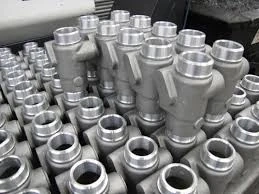Aluminum is a versatile metal that has found numerous applications in various industries. One of the most popular uses of aluminum is in the form of castings. Aluminum castings offer a wide range of benefits that make them a preferred choice for many manufacturers.
First and foremost, aluminum castings are lightweight. Aluminum is about one-third the weight of steel, which makes it ideal for applications where weight reduction is a priority. This can be particularly beneficial in industries such as automotive, aerospace, and consumer electronics, where lightweight components are essential for fuel efficiency, performance, and portability
Another advantage of aluminum castings is their excellent strength-to-weight ratio. Despite being lightweight, aluminum castings possess high strength properties, providing structural integrity and durability. This makes them suitable for applications that require sturdy and reliable components
Aluminum castings also offer excellent corrosion resistance. Unlike other metals, such as iron or steel, aluminum does not rust. It forms a protective oxide layer on its surface, which prevents further oxidation and corrosion. This characteristic makes aluminum castings a great choice for outdoor or marine applications, where exposure to moisture and harsh weather conditions is common.
Additionally, aluminum castings have superior thermal conductivity. Aluminum is an excellent heat conductor, allowing rapid heat transfer and dissipation. This is highly advantageous in applications such as heat exchangers, radiators, and electronic cooling systems. The ability of aluminum castings to efficiently manage heat helps in enhancing the performance and longevity of various devices and equipment.
Furthermore, aluminum castings offer exceptional dimensional accuracy and intricate design capabilities. The casting process allows for complex shapes and intricate details to be achieved with precision. This makes aluminum castings versatile and adaptable to various design requirements, offering manufacturers the flexibility to create custom-made components.
Cost-effectiveness is another significant benefit of using aluminum castings. Aluminum is abundantly available and widely recyclable, making it a cost-efficient material. The casting process itself is economical and allows for high production rates, reducing manufacturing costs. This makes aluminum castings a cost-effective solution for industries looking to optimize their production processes without compromising on quality.
Lastly, aluminum castings are environmentally friendly. Aluminum can be recycled repeatedly without losing its properties, making it a sustainable choice. The energy required for recycling aluminum is significantly lower compared to the production of primary aluminum, resulting in reduced greenhouse gas emissions and energy consumption.
In conclusion, aluminum castings offer a multitude of benefits that make them highly attractive in various industries. Their lightweight, strength, corrosion resistance, thermal conductivity, dimensional accuracy, cost-effectiveness, and eco-friendliness make aluminum castings a reliable and versatile choice for manufacturers. Whether it's in the automotive, aerospace, electronics, or any other industry, aluminum castings continue to prove their worth and contribute to technological advancements.


